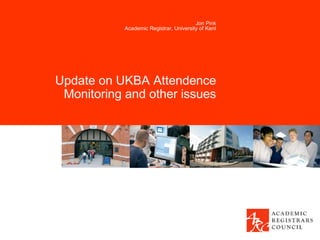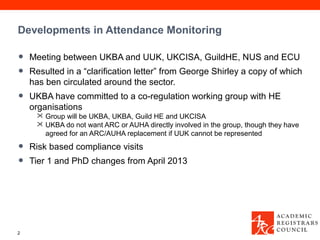Jon Pink UKBA
- 1. Jon Pink Academic Registrar, University of Kent Update on UKBA Attendence Monitoring and other issues
- 2. Developments in Attendance Monitoring • Meeting between UKBA and UUK, UKCISA, GuildHE, NUS and ECU • Resulted in a “clarification letter” from George Shirley a copy of which has ben circulated around the sector. • UKBA have committed to a co-regulation working group with HE organisations Group will be UKBA, UKBA, Guild HE and UKCISA UKBA do not want ARC or AUHA directly involved in the group, though they have agreed for an ARC/AUHA replacement if UUK cannot be represented • Risk based compliance visits • Tier 1 and PhD changes from April 2013 2
- 3. Attendance Monitoring – Main Points from UKBA • The intention of the attendance monitoring policy is not to put existing layers on existing processes, nor is intended to monitor students to the ‘nth degree’ • The intention of attendance monitoring was never for institutions to create separate systems for international students • UKBA officers are not interested in the technicalities of contact points determined by individual sponsors. They are interested in sponsors having appropriate systems in place and the outputs from those systems being satisfactory • Policy on attendance monitoring has deliberately not been prescriptive as it has to cover 2,000 Tier 4 sponsors • UKBA accepts that input from individual compliance officers has in some cases driven particular approaches to be adopted by institutions and that these have on occasions been “outside the spirit of the Tier 4 rules” 3
- 4. Attendance Monitoring – “Set of Principles” • During the meeting in early January, it was suggested that the sector could develop a set of principles setting out a few high-level commitments in relation to attendance monitoring (or ensuring on- going 'engagement with studies'). • UKBA have said they will work with the sector to produce this but it won't be a formal UKBA document. • It is something that a range of organisations could sign up to including UUK, UKCISA, NUS, ECU, GuildHE • It was felt that the principles themselves should be developed by practitioners and supported by other bodies 4
- 5. Attendance Monitoring – “Set of Principles” • ARC would be involved in developing these principles alongside other bodies • The principles could include commitments to: (i) focus efforts on the academic engagement of international students (ii) align processes to broader institutional policies on academic engagement for all students (iii) determine expected contacts over a reasonable timeframe (iv) minimise the extent to which international students must present themselves to their sponsor outside of timetabled academic activities (seminars, tutorials, lectures, meetings with supervisors etc). 5
- 6. Attendance Monitoring – Next Steps • Not clear what the timescales are for the attendance monitoring principles. • The letter from George Shirley does not say anything new only restates existing guidance • There is a meeting of the ARC UKBA Practitioners Group on 3 May, this will focus on attendance monitoring • It is now in the sector’s court to produce a set of principles and submit to UKBA • We will be working with UUK, UKCISA, Guild HE etc to produce some draft principles 6
- 7. UKBA Tier 4 Compliance Visits • UKBA have given a clear indication that future compliance visits will be carried out using a risk based assessment • Institutions may still receive licence renewal visits and account manager visits • If an Institution is seen as a risk for example as a result of: Poor audit reports/fines from HEFCE etc Overseas agents have been investigated and found to be wanting Illegal workers found who are students • These, and a range of other possible factors, could build into a picture that the Institution is a risk to immigration • A full compliance visit will take place, at least 20% of student files examined, several UKBA staff for several days • Message – less likely to be visited but if you are there are problems 7
- 8. Tier 1 Graduate Entrepreneurs • 1900 places will be available from April 2013. Of these, 1000 places will be allocated to MBA graduates and 900 will be allocated to graduates of all other disciplines • Each HEI can apply for 10 MBA spots and 10 additional spots. • Applicants can apply either in the UK or out of country. For out of country applicants, they must have graduated from the endorsing university within the past 12 months. • Post doctoral researchers who are currently working for a HEI under a Tier 2 General visa are eligible to apply for the graduate entrepreneur route. • They must hold a UK degree or PhD, but it does not need to have been awarded in the past 12 months and it may be awarded from a different UK institution. 8
- 9. Tier 1 Graduate Entrepreneurs • The 20 hours per week work restriction will be lifted for those who already have Graduate Entrepreneur leave when they apply to extend their leave. • The HEI must assess that the migrant has a genuine and credible business idea. • This is a change from the current requirement of a world class and innovative idea. • This can include starting a business or helping to develop an existing business. • You should have received and invitation to confirm the number of places you need 9
- 10. PhD Extensions – Still need clarifications • The PhD extension scheme is being put in place to allow those who are about to complete a doctorate at a UK HEI the opportunity to extend their leave by 12 months in order stay and work in the UK • The type of work is not restricted. Within 60 days of course completion a student may apply to extend their Tier 4 leave - the student must apply for leave while they are in the UK before their course ends. • The intention is that the sponsoring institution will issue a CAS for the doctoral student which they can then use to apply for the 12 month visa. • The graduate can then use the CAS to apply for another Tier 4 visa 10
- 11. PhD Extensions – Still need clarifications • The scheme differs from the post-study work visa in that graduates must be sponsored by the institution from which they received their doctorate • Sponsoring institutions will be expected to monitor any doctoral graduates, however the way in which this will be accomplished is still under consideration. • The Home Office has indicated the monitoring could include at least 3-4 contact points with the graduate during the year, but this hasn't been finalised. 11
- 12. PhD Extensions – Still need clarifications • UUK has brought a number of matters of concern with the extension scheme to the attention of the UKBA: The course end date for the scheme will be defined on the date on which the institution informs a student of the outcome of their doctorate Students will have to apply for the extension while they're in the UK. This can be problematic as some students leave and go home to write their thesis. They come back to the UK on a student visitor visa for the viva. In this case their Tier 4 visa has expired and they wouldn't be eligible for the 12 month extension. Contact is expected to be required around 3 or 4 times a year, and it will not have to be in person. It is not yet clear what the UKBA wants Tier 4 sponsors to find out from their graduates. The UKBA has been made aware that institutions expect explicit guidance on what should be asked at a contact point, how the graduate should be contacted and how regularly so that everyone, including the graduates, are clear about these requirements and the consequences of non-compliance with them. 12
- 13. Questions 13












